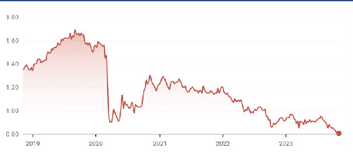The Listed Property Sector has been doing it tough over the last couple of years. The problem has been cyclical and structural headwinds blowing in tandem.
A good example of the impact of those headwinds is one of our largest and oldest listed property vehicles, Kiwi Property Group, which is currently trading 50% lower than where it was in 2020.
Meanwhile, Goodman Property Trust has been one of New Zealand’s best-performing of the listed property vehicles and is down a mere 25% from levels it traded at last year.
Kiwi Property Group

Listed property has always been a popular place for New Zealanders to invest. It’s no secret that Kiwis love property investing, and this bias makes the listed property sector popular with retail investors, as well as many wholesale investors. The bricks-and-mortar nature of these businesses make them straightforward to understand (and hopefully manage); they own buildings and collect rent on them. Another attraction of the sector is its focus on paying dividends, which again attracts the interest of many types of investors.
Another dynamic that investors appreciate about listed property is that the transparent business model and steady dividends should mean less volatile share price performance. This popularity is well demonstrated by the fact that 8 members of the S&P/NZX 50 are listed property vehicles, from largest to smallest; Goodman Property Trust, Precinct Properties, Kiwi Property Group, Property for Industry, Vital Healthcare Property Trust, Argosy Property, Stride Property Group and Investore.
Listed property will always be affected by the economic cycle, with a degree of amplification due to the habitual use of debt in the sector and the impact of interest rates on the value of its property portfolio. Economic expansion should boost tenant demand which is good for rental income. If you also have the backdrop and the Reserve Bank of New Zealand setting near zero interest rates, a listed property vehicle will have rising valuations on the buildings it owns, as its rental income will be worth more due to the prevailing low interest rates.
That paradise has been shattered by rising interest rates and an economic slowdown which have both come in mean doses these past two years. However, these moves while sharp are not extraordinary, listed property will always experience an element of in favour and out of favour depending on the economic cycle and associated interest rate fluctuations, but something more is generally required to cause the likes of Kiwi Property Group’s share price to more than half.
That something extra, to cause even greater distress for the listed property sector, is structural change. All listed property own assets made of steel, concrete, glass and bricks but not all are built for the same purpose. Generally, there are three main types of buildings owned.
Office: Retail; and Industrial.
Two of the three are in the process of being disrupted. Owning a shopping mall has become less attractive due to the shift to online shopping. Forecasting the impact of future interest rate moves is hard enough but forecasting the eventual impact of a structural shift is magnitudes harder. This in turn makes gauging an appropriate share price move near impossible, especially when investors were likely attracted to listed property in the first place because of its simple business model and relative stability. In such a situation, where investors are surprised and disappointed, downward share price moves can be even more precipitous.
The other disrupted type of building is, of course, Office. There had been a slow burn trend of working more from home, as businesses moved to online collaborative working tools such as Microsoft Teams and Zoom combined with the shift to “hotdesking”. That trend became a runaway train due to virus lockdowns. Again, with this disruption, we don’t yet know the full impact. A combination of tenants having five-year plus rental agreements and a new status quo yet to emerge as to the new normal in terms of working from home, means we are still some time from knowing the full answer. But it’s almost certain that there will be a lower level of long-term demand for office space. A recent headline in The Independent read “New York City has 26 Empire State Buildings worth of empty office space after pandemic”
The third most common type of property got a free pass on disruption. Industrial properties are not currently subject to a significant structural challenge, so the likes of Goodman Property Trust are mainly facing the headwinds of rising interest rates and easing demand. Albeit in October another headwind emerged that affected Industrial property owners as well as the other listed property vehicles. The incoming coalition government has abandoned a tax break that commercial property owners enjoyed, and depreciation on building values is no longer eligible for use as a tax deduction. The impact varies between the various listed property vehicles, but according to analysts the overall hit to property sector cash earnings is 5%.
So, when will listed property once again return to favour? It could be close to a turning point, plenty of bad news appears to now be factored into share prices. The trouble with making that call is the unknown ultimate impact of structural change on Office and Retail assets. The other slight concern is the level of debt the sector caries, if interest rates end up higher for longer, it will be another headwind on earnings.